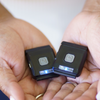Navigating the Teen Years

Comparing self to someone who isn’t the norm.
People only show you the outside and people wouldn’t know you are anxious and you don’t know how they really feel.
We want to view feelings as messengers and acknowledge them but not attach to them so that they keep getting bigger. When we do this we ignore things that are true. Anxiety is creative and loves the worst case scenario so in this situation acknowledge it and then focus on facts and not feelings.
Just because we have a thought doesn’t mean it’s true.
Thoughts come from what we are exposed to the most. Is this the norm? Have to get comfortable being uncomfortable instead of fighting it because it is an unavoidable parent of that.
I love having clients have a note on their phone or an easy-to-access picture that reminds them of facts that their emotions dismiss. When we are in our tornado, it is hard to problem-solve and best to be prepared. Asking questions gives the tornado more speed, and feeling a spouse's or parent's feelings on top of your tornado just makes two tornadoes and a lot of strong emotions.
Menus (card decks, pictures, simple handouts) are like a roadmap for when our brains get hijacked by our emotions, triggers, or a difficult situation. Menus and metaphors both provide a safe distance for kids and adults to express their inner world. They also put words to things that are hard to explain or that we don't yet have words for. When our stress response system is on high alert, our brain feels hijacked and explaining how we feel becomes difficult, overwhelming, and we often feel frozen.”
Tweens and teens tend to shut down or avoid conversations with their parents when they make the following common mistakes out of love, care, and concern: (TouchPoints are helpful for you and your child when discussing things!!!
They want to feel seen and heard and don’t want advice. They are seeking comfort and co-regulation.
Letting our anxiety run the conversation usually leads to asking questions out of fear. This can make kids feel like you don't trust them, like they are being interrogated, and raise distress, anger, irritability, and anxiety. TouchPoints prior and during.
Not pausing to regulate yourself before the conversion. Kids at this age feel immense pressure and can't hold your feelings on top of their own. Tone, timing, delivery, and words matter. (TouchPoints come in handy here) Comparing them to a sibling or friend.
Forgetting that each of your children is different, and their needs and preferred methods of communication will also be different.
Chronological age often doesn’t match their social emotional or developmental age, particularly as you look at what stages were missed during the pandemic.
Making a conversation too formal, sitting at a table face to face). The conversation is best when you see an organic opportunity to spark them, and that allows for breaks with eye contact and movement. I love talking with my kids in the car while shooting baskets, cooking, making art, or at night when the lights are off.
When you have your phone by you or on the table, kids are less likely to talk openly because they know they don’t have your undivided attention.
Expecting or pushing to have the conversation all at once. Look for cues that you or your kid or teen need a break. Fearing we will not forgive the person they may be upset with and will try to restrict hanging out with them once things are resolved. Fearing they will be punished for opening up to us.
.
.
.
This is a guest article written by Carron Montgomery
Carron Montgomery is an author, mental health expert, registered play therapist, trauma specialist, speaker, trainer, and consultant. She has a private practice that specializes in treating anxiety, depression, divorce, trauma, and grief and loss. Carron has written several books and is working with Satiama Publishing company on the second edition of The Invisible Riptide and a graphic novel on social media, which will both be released this fall. Carron has written the original Invisible riptide and is co-author of From Surviving to Vibing: Filling in the Gaps. Carron likes to refer to herself more as a storyteller, as her writing often reflects the words of many generations and lessons from her life, as well as the remarkable clients who teach her as much as she teaches them. Her clients and three young children continue to remind her how precious life is every single day. Carron has extensive training and experience with Cognitive-Behavioral Therapy (CBT) and associated modalities such as mindfulness, EMDR, Play Therapy, Sexual Abuse, Trauma and more specifically, TFCBT. Carron also has real-world experience as a mother of 3 young children and is active in the community as a mother, daughter, wife, advocate, and clinician. Carron’s passion is working with children, teens, young adults and women. Carron believes in collaboration and community. Carron loves to help normalize big feelings and negative beliefs by educating both her clients and their parents on the how and the why behind the purpose of feelings and the mind body connection. Carron’s approach centers on reducing the power differential, and she believes in the power of meeting her clients where they are, knowing that they are doing the best that they can with the knowledge and information they possess. She loves telling her clients that it is “only easy when you know how, and you can’t know what you haven’t been taught.” Carron often writes about the gap in acceptance and knowledge about mental health across generations. Carron loves empowering her clients and sees only normal people! Her approach is customized to each client and consists of front loading on psychoeducation and building rapport. Carron has written about the use of menus and metaphors in therapy and the classroom. She believes they serve many helpful purposes and uses them in both her practice and trainings. Menus help normalize many thoughts and feelings, and also provide words for kids and adults when they do not have them or cannot access them because of a heightened stress response system. Carron is an avid reader that loves reading about neuroscience to help educate and inform her clients to make their own decisions. Carron uses evidence-based strategies and tailors them to her work with each client. Collaboration is essential to her practice and beliefs in helping create a team of professionals who can speak a common language. Carron loves presenting workshops to parents, schools, and other professionals and training hospitals, teachers and school social workers. Carron is an avid writer that uses writing to reach a wider audience and as a healthy coping skill to help her digest her clinical work. She is always working on a book, articles or an upcoming podcast or speaking panel. She co-founded The Invisible Riptide organization with Dr. Caroline Danda to reach more people and promote the importance of understanding mental health across generations and in schools and businesses. The mission of The Invisible Riptide is to help children, adolescents, and the adults involved in their lives learn how to engage in effective conversations, create meaningful connections, better understand mental health, and build resilience. Her previous training includes undergraduate training at Denison University and graduate school at Avila University and pursuing training to become a registered play therapist and level II EMDR certified. She began her career interning at Swope Behavioral Health and MOCSA (The Metropolitan Organization to Counter Sexual Assault). She was hired by MOCSA following her internship, where she continued to work and testify on behalf of her clients for over three years. After her time at MOCSA, she moved to Operation Breakthrough, working with families and underprivileged kids and teens. Once she had her first child, she moved into private practice and formed Aster Counseling, LLC. This allowed her more flexibility to be with her son and to practice what she taught her clients. Carron has been in private practice for a decade and enjoys every minute of her work! Carron’s career pivoted, as she saw a growing need for non-intimidating and accessible information to a much broader audience amidst a growing mental health crisis. She enjoys training clinicians and her intern. Carron was surprised to discover a deep passion for writing and being in a teaching role




